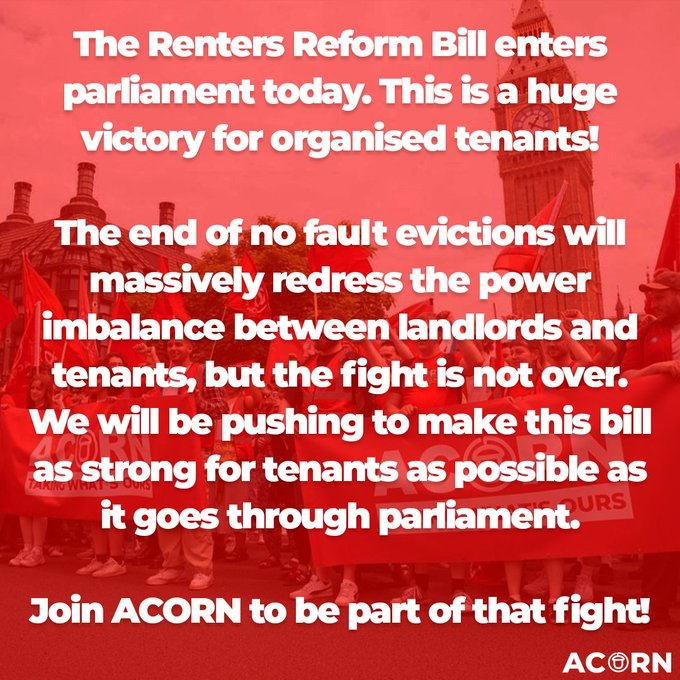Four years in the making, the government published the Renters’ Reform Bill yesterday to “bring in a better deal for renters”. The Bill got its first reading in Parliament on Wednesday, with the second reading due within a few weeks. It abolishes ‘no-fault’ evictions, provides a structure for landlords to evict unruly tenants, and limits rent increases. The Renters’ Reform also introduces a Private Rented Sector Ombudsman to settle disputes between landlords and tenants. At the same time, it grants tenants the right to request a pet, which landlords cannot unreasonably refuse. Finally, a Privately Rented Property Portal will serve as an information hub for landlords and tenants.
While charities have welcomed the Bill, coining it a “once-in-a-generation opportunity to finally fix private renting”, they have stressed that the government must “truly deliver” change for tenants.
Speaking at the publication of the Bill, Housing Secretary Michael Gove said:
“Our new laws introduced to Parliament today will support the vast majority of responsible landlords who provide quality homes to their tenants while delivering our manifesto commitment to abolish Section 21 ‘no-fault’ evictions.
“This will ensure that everyone can live somewhere which is decent, safe and secure – a place they’re truly proud to call home.
“This government is determined to tackle these injustices by offering a new deal to those living in the private rented sector; one with quality, affordability and fairness at its heart.”
What the Renters’ Reform Bill means for tenants
With the Bill affecting 11 million tenants and two million landlords, its details will face in-depth scrutiny. The government sought to strike a balance between protecting tenants and ensuring landlords can reclaim their properties from disruptive tenants. Although the ban on ‘no-fault’ evictions meets a core demand by campaigners, they have pointed out that unreasonable rent hikes could still push families into homelessness.
Under the Bill, Renters displaying “irresponsible” behaviour will face shorter eviction notices if they have, for example, breached the tenancy agreement or damaged the property.
Animal charities have welcomed provisions allowing renters to keep pets. Landlords can no longer refuse permission unreasonably but can demand renters buy pet insurance to cover potential property damage.
If disputes arise between tenants and landlords, they can seek the support of the Private Rented Sector Ombudsman in providing impartial, fair, and binding resolutions outside the costly court system.
Landlords must keep rent increases within market value as adjudicated by a tribunal. This mechanism protects renters from sharp rent increases that amount to ‘back-door evictions’.
The new Privately Rented Property Portal will deliver information and guidance to tenants and landlords in relation to their rights and obligations. Councils can use this system to enforce the laws as they apply in different scenarios.
‘Long overdue’ Bill receives a guarded welcome
While campaign groups and charities have hailed the Bill as a victory, they insist more measures are necessary to protect renters. Chief executive of the homeless charity Crisis Matt Downie said:
“Over the coming months, we look forward to working with the government as the Bill progresses. Now is the time to finally put an end to unnecessary evictions that force people into homelessness and ensure that everyone has a safe, secure place to call home.”
Landlord associations have been less enthusiastic, with the chief executive of the National Residential Landlords Association, Ben Beadle, urging for more details:
“Responsible landlords need to be confident that when Section 21 ends, where they have a legitimate reason, they will be able to repossess their properties as quickly as possible. Without this assurance, the Bill will only exacerbate the rental housing supply crisis many tenants now face.”
On GB News, Nigel Farage led his show with the caption “War Against Landlords?”, headlining Beadle as saying the Bill would bring about “the biggest level of divestment in a decade”.
For his part, Tory MP Jacob Rees Mogg, a landlord himself, made an impassioned speech against the Bill, going as far as to dish out praise to Labour.
In Parliament, Shadow Housing Secretary Lisa Nandy said:
“The government first promised reform for tenants in the private rented sector over four years ago. But after years of delay, broken promises and arguments amongst themselves, the private rented sector increasingly resembles the wild west, and it’s far from clear that this government can deliver.”




